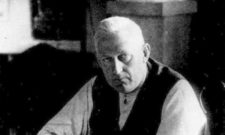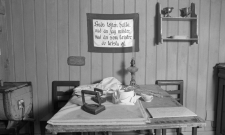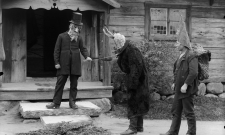Shop our historical maps

Aug
"civilization was a gilded hell, a debauched ruin, where the most unwary counterfeiters and plunderers took the lion's share of the spoils"
When I entered the world, the first thing that made an unpleasant impression on me was the haze of mean-spiritedness that surrounded not a few of the "upper class" I had imagined in my childhood as mighty matadors of morality and chivalry. In the region where I was brought up, it was considered simple to take interest on a loan - since then the principle of capitalism has taken hold there too. A family that refused to give a beggar food or money was regarded by the other villagers with the same contempt as modern workers regard a strike-breaker - in both cases the feeling that we should be brothers and help each other is expressed. If a man refused to give a fishing net to a fisherman who had lost his, he was considered as bad as if he had stolen the other man's net; the same was true if, after a fire, someone refused to contribute to the construction of another hut.
There might be shoemakers out there, but they were thinly sown, the struggle with the barren peat and with the sea made the souls defiant and brutal, but honest and healthy. God-fearing men were, but if God let one go too long and toil and starve and give nothing, or if he sent a blizzard so that one had to hold the sea for nights, even days, then one put the wooden pestle harder on the bulkhead, clenched one's fist tighter around the tiller, and sailed without his help, until he became kind again, when one was reconciled and became just as god-fearing again. It was something like the kind of godliness that Schiller depicts in his song to joy: "No god that strikes lightning, no bondage, order only".
The police were not known beyond the fact that it was known that they were some strange curries, whose business it was to tease the fishermen's boys every Midsummer's Eve and "Free Week Saturday", when all the youth went to town, and about his wonderfully high-ranking majesty the county mayor was only known to tell some obscure tales about him bringing up his son in the not uncommon way that the young were taken in the village, who did not obey instantly, by the calf and flung him across the room into the door or the wall, and they attributed this radical upbringing to the gratifying fact that the son then advanced in life to the position of bailiff. Judges, governors and tocket people were something the king invented because they would help him eat up the taxes, that much was known, but they were never cared for. You made your own deal with an antagonist who wanted to take your boy away from you by cutting him with a carving knife or by hitting him on the head with a pebble wrapped in a handkerchief. This was the cheapest of all, so that none of the suspected sub-animals, called judges, made any money out of the bargain.
No wrong was to be unhonoured, no quarrel unheeded, and therefore in the course of time people had got used to dishonouring others, the causes of strife being either misplaced pride or the blind, never-responding love, when they emerged from such an environment of honesty and strength, one soon became not a little disillusioned in the study of the race called the upper class, before learning that "all that glitters is not gold" and learning to wean the upper class from its dross of moneyed class and its minions.
A reappraisal of the old false values gradually followed, and at last it was found that it was the old fishermen and their goons who constituted the real upper class, and that the gentlemen in frock coats and turnover collars generally belonged to the pack. The whole of so-called civilization was a gilded hell, a souped-up ruckus, where the most unwary counterfeiters and plunderers took the lion's share of the spoils, where the social standing of the high-bred "men" rose in step with their ability to prostitute themselves, and where everything had other names than among the old men in the humble bunkhouses. He who was spineless was called agile and if he had two or more tongues in his mouth he was a prominent politician, he who committed such crimes against the individual and the honest work property rights that they would have returned him a shot one evening in a less "civilized" society became vassal knights, and he who for their sake threw workers with women and children out on the bare hill, after he had first plundered them, was called a social player, which he was in fact, a pillar of a society ruled by fools, far from all of whom were harmless. It was, in a word, a most curious society. At first one was astonished at its audacity, then laughed at its madness, but at last one found it too deplorable a state of affairs to laugh at. Strangest of all, however, were the representatives of the "free word," a sort of tramps of the spiritual life; too little enterprising to steal, they sat for small money and lied to the most insolent violent men and the most cunning thieves. They had their own special morality. Pettersson, the robber, was society's greatest benefactor, and was to enter the first chamber and the town council until his rival Andersson gave 20 crowns more a month, when, according to his statement, Andersson immediately took all Pettersson's former excellent qualities and Pettersson became a nobody. There was a large number of people in society whom Pettersson and Andersson had robbed and who had nothing to hire a liar for, these creatures were of course beneath contempt and would be brought down in every conceivable way. And if someone came and said the opposite, he was called a traitor to his country, an enemy of society, which in fact he was, for Andersson's wallet and Pettersson's servants constituted society.
The others were excluded from it, and society also passed monkhood and exemption laws against them. Sometimes the hired liars made such blatant lies about those who stood outside the society of Andersson and Pettersson that the liars were offended by the shamelessness and insolence and did not come to answer them. For example, Stockholms Dagblad wrote on 22 August 1906:
Freedom in danger.
On Midsummer's Day 1906, a Swedish woman is immersed in her reading when the doorbell rings, and thinking it is the postman, she goes to answer it. (She was all alone in the flat.)
A young man of about 22 years enters with great certainty and asks if so and so is the name. Upon the affirmative answer, he continues:
- Ooh member of the Swedish People's Union?
- Yes.
In heated tones:
How can one borrow for such shoddy work?
- What do you mean?
Well, that we regard all as traitors who belong to that covenant.
~ It can hardly be considered a traitor, which does not belong to your party? You're a socialist, aren't you?
- Yes, I am, and I want to tell you that we intend to persecute anyone who organizes against us. Therefore, stop your dirty work.
- My task is as sacred to me as yours seems to be to you.
- You sound brave now, but bigger eyes than yours can be burned. We always give three warnings. This is the first.
With that, he took his hat and walked icily out of the room.
Every man who has the slightest acquaintance with modern Swedish workers knows, even if he does not see it in the crusty style, that this story is one of those gross lies, the simplicity of which makes one wince. No worker acts in this way, nor would possibly only an employee of Stockholms Dagblad would act, if he were not too cowardly even to do so. But if one thinks that such a manfolk, who spins such a clumsy lie and does not even give us the name of the wronged man, if you, I say, think that he does not consider himself a mighty pamp in comparison with a fisherman in the Stockholm or Bohuslän archipelago, then you are mistaken.
Such strange products of human harbour are produced by this society!
Subscribe to YouTube:
If you appreciate Allmogens independent work to portray our fine Swedish history and Nordic culture, you are welcome to buy something nice in the shop or support us with a voluntary donation. Thank you in advance!
Support Allmogens via Swish: 123 258 97 29
Support Allmogens by becoming a member
Support Allmogens in your will








